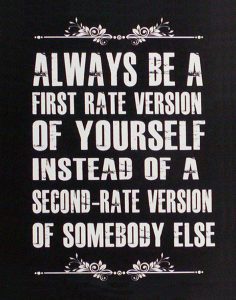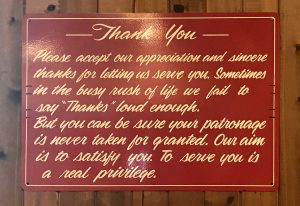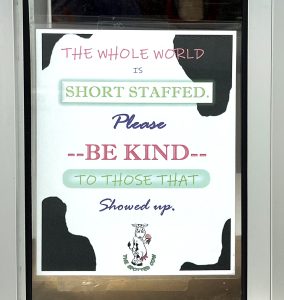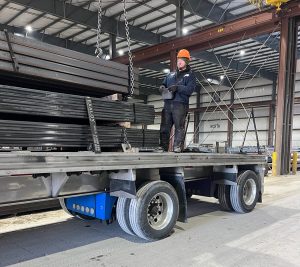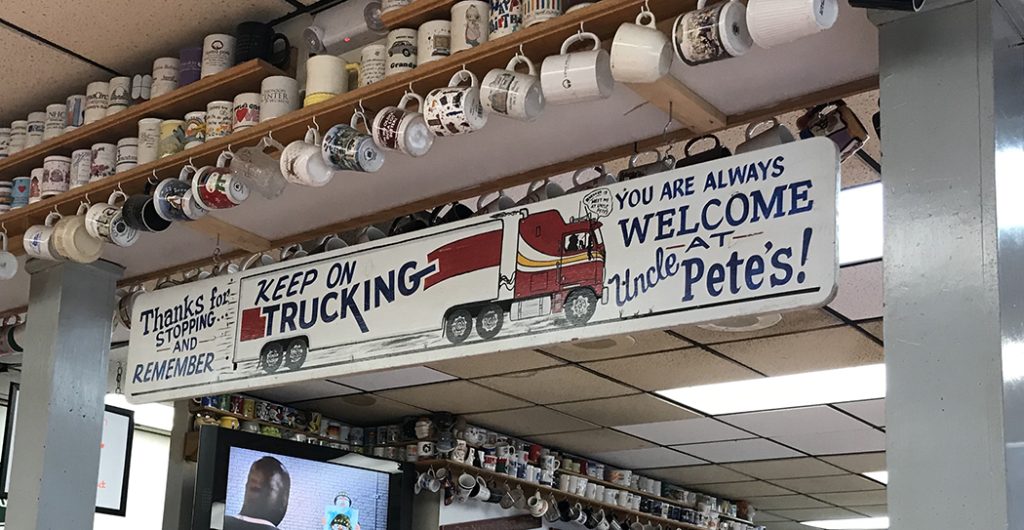
Spring is here – at least it’s started on the calendar. In the world of trucking, it’s official since MATS is now in our rear-view mirrors, and the truck show season is under way. I can confirm a sighting of Stephanie Haas and others photographing the rigs at the Kentucky Expo Center last week. Hopefully, some of you were able to attend the largest transportation related event of the year in Louisville, Kentucky. I know I did, and just for the record, I now have enough new ideas on how to change up my old ride to sink a battleship.
While we were there, we saw some things, and I’m sure the ideas were pirated from my work bench. I wonder if Penny the Pooch has been selling me out to raise money for more doggy biscuits? I guess you can’t be too careful who you talk to! I saw a lot of old friends, and possibly made a few new ones, too. I took the time to check out the show trucks parked in the lot for competition while waiting to enter the convention building. I’m sure glad I didn’t have to compete with some of that high dollar iron. I’ve got a couple BOS (Best of Show) trophies from MATS from years gone by, back when most of us were “working” trucks.
Back in those days we couldn’t conceive of trailering our creations to an event. Today, it’s becoming much more common than not. I can say with great certainty that some of us were accused of doing just that, and of having more than one truck that looked the same – one for competition and one for commerce. If there had only been that much money in trucking back then, most of us wouldn’t still be pushing the wheels of an old diesel up and down the road today.
I do still enjoy the time I spend viewing the older trucks, those with some war wounds and imperfections, derived from time served. Standing next to a vehicle, I try to let it, the truck, tell its story. Listening to a driver relate the event always brings a smile to my face. Mostly, I can hear the passion in their voice, and maybe how they attacked the problem or what led up to the trouble. Sometimes it’s the humility of them realizing their own mistake – “do as I say not as I did” – might be the lesson. After close to 50 years behind the wheel, I can relate to almost every situation they describe. Yes, I’ve done some dumb stuff too, and some of it was downright stupid, and all too often it turned out to be dangerous, as well.
Possible future drivers be warned: if you want a safe and sane life, than seek employment elsewhere. There may be truth in the songs people sing in our honor. “East bound and down, loaded up, and truckin” is one that springs into my mind. There are others too, like 30 Thousand Pounds of Bananas, and Six Days on the Road. Trucks, trains, and fast cars are the subject of folk lore, but in today’s bubble-wrapped society, I’m afraid we are losing the stories and the overall desire to push the limits, of both ourselves and our equipment.
As I’m preparing to tune my old truck up for the summer months, it needs to be spit-shined from top to bottom, too. Here at the end of our road I’m the chief mechanic, the tire guy, and you guessed it, the wash attendant, too. I know I will need to do more dumb stuff if I want to stand tall with the Big Dogs at the local truck stop. It’s possible I’m the reason the township bought that new ambulance. I’ve seen it parked down at the end of my driveway a couple times. They seem to be more worried about me standing on an 8-foot ladder, buffing the paint on my roof, than I am!
The saying “Go big or go home” is a common refrain in our industry. We use it to describe many aspects of our lives and our work duties. When I use the term “go big” I’m talking about doing something special or going out of my way to impress others on my service. This is not to be confused with bragging or being boastful. What I’m referring to is doing a good job or going out of my way to provide a service above and beyond the expected.
Service today is a lost art. What got me thinking about this topic was an experience I received last week when loading steel at one of our shipping points. Normally, I don’t service this account (notice how I used the word “service” and not load at or ship from). In the business I’m in, service is the only commodity we have to sell. Anyone can load and move this stuff. Note to self: the sweet flavor of a low price is often lost to the sour taste of poor service!
Far too often we only notice when the service is substandard or less than we expected. How often do we overlook good (or even exceptional) service just because we weren’t discomforted during the process? Think about anything we do and then put that in the context of service provided. I had the good fortune to load three separate loads in Columbia City, Indiana, where the overhead crane operators were possibly the best I’ve ever worked with. They not only loaded my trailer in a timely manner, but they took extra precautions to insure they didn’t damage it (my trailer) or the freight. They even offered to help secure my load to speed things up for me. For the record, I searched out the supervisor and complimented the company and the skills of their workforce.
Few of us can live up to the standard that we would expect from others. I’m a person who lives in a world governed by positive energy. I don’t go looking for things to complain about or criticize. Yes, I except that not all people will be compatible with the job assigned to them, but that doesn’t mean they get a pass on doing less than their absolute best, at whatever that might be. The responsibility for my expectations are on me, and in normal situations, if I can see a degree of difficulty that overshadows their honest, well-intended efforts, then it’s my opportunity to help – if I can.
How often do we lend a helping hand or jump in to assist before someone asks, even if it’s only to offer guidance, because you yourself have struggled with the same issue? If you do offer help and it’s rejected, you can’t be offended, because it was offered as “help” not part of their job. By the same token, if they don’t take your assistance and their own way proves to also not work, you still don’t get to complain about the failure. Compounding a bad situation with “I told you so” isn’t going to speed things up, either. Sometimes you have to walk away and give them a minute to compose themselves and reassess the issue. Then, if you are consulted and asked for advice, think before you speak. Starting your sentence with words like “I” or “Me” probably isn’t going to be helpful; try using “we” or “us” making it more inclusive and sharing the responsibility (the other person may already feel like an idiot). This way, at this point, they may feel it was more of a bad choice and less of a service failure.
Bad service or a low level of help or assistance is most often displayed as an example, however what do you do with good service or the times when you’re amazed at the professionalism displayed? Do you complement that person or group of people? Do you report their deeds to a supervisor, or just carry on as if that was their job in the first place? I’m sure all of us have a list of customers we prefer to do business with for varying reasons. All these reasons stem from some level of service, from the guard at the gate, to the cleanliness of their restrooms, if they have any.
Price or freight rates are also a measure of service. In my experience, the worse the service the more I would request in the rates. Time is money, and wasted time is lost money. Anytime an employee has to figure out how to load your trailer it is costing you, so when you get to a shipper that has trained and productive loaders, you want to go back there for more loads. If the product is properly prepared for shipment and rides well to its destination, that is a service, too, so be sure to offer feedback to the managers for future loads. Any positive exchange of information is a service from you, and remember, you’re being graded as well, by them. Don’t be afraid to ask questions about the commodities you are expected to transport. Once again, the more you know about their product, the better you can serve your customers.
I know some of our readers are contract, or lease operators, who don’t get the option of choosing who they load freight from or to. With that being said, each of them has the opportunity to provide such exceptional service that the shipper or the end user will request them on future loads. As a truck driver, you become the face of every company whose product you’re transporting. That may appear on the surface to be a little over the top, but in reality, it’s true. You, the driver, are probably the only person a consumer or distribution center worker will ever come in contact with. How they receive you or react to you can and will affect their future purchases.
I can give a perfect example of when the office in a faraway town gave incorrect information to the receiver, and the train came completely off the tracks, causing considerable expense and disruption to a customer. I was that driver who was saddled with delivering a 12-foot wide load from Seattle, WA to Detroit, MI. The load needed to be inspected and fully tarped, then permits were ordered, and the waiting game began. This load was scheduled to move the first week of January a few years ago. Under normal conditions I would make the move in around five days.
For those of you who travel in the north country, you are already thinking about weather conditions and shutdowns due to accidents. The regulations for moving oversized loads are far more restrictive than common freight, so that too can cause trouble for a driver. Long story short, I needed eight days to safely make the delivery, since the dates fell over a weekend. The owner of the machinery met me at the front gate and started chewing out my hide. All he was asking was, “Why you no drive?” And then again, “Why you no drive?” I was somewhat bewildered by his outburst, as I thought my delivery timeline was considerably better than what should have been expected.
After I got over the shock of this man’s indignation, I calmed him down by asking what he had anticipated. Turned out that someone in the billing department had promised him three day delivery (a team request) for which he had ordered machinery riggers to off load. This is very expensive and set the production schedule back considerably. At that moment, I became the company, and it was now my job to explain the difference between being charged for a team request versus over dimensions.
When he questioned why I didn’t drive, I showed him the permits with their requirements for daytime travel only, no weekend travel, and subject to weather conditions, along with my logs showing compliance with the DOT rules. By taking the time to explain proper procedures, I calmed the customer and found where the trouble started. Turned out he was a very reasonable man, and not only did he remove his suit coat and tie, he donned coveralls and helped me roll my tarps and remove securement. I moved eight more of those loads for him in the months that followed.
That experience could have had a totally different outcome if I had reacted like so many of the operators on the road today. Getting an “I don’t care” attitude doesn’t help anyone. Pointing fingers and placing blame will only exasperate the problem at hand. I get it – we are not all cut out to be a service worker. Your only other option is unemployment, and even then, you must provide some type of service to get paid. Starting now, make an honest attempt to reward good service with kind words and deeds. Those deeds should help others to see kindness in your ways.
Pay it forward and remember the Golden Rule, “Do unto others as you would want them to do unto you.” Someone said it takes fewer muscles to smile than to frown, so put your best smile on and encourage others to do the same. Save those other muscles so you can provide a better service to your customers from here on out!


